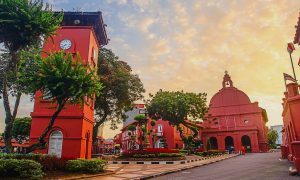THOUGH MANY LEAVE THEIR HOME COUNTRIES FOR JOB REASONS OR FOR PERSONAL ADVENTURE, THERE IS NO SHORTAGE OF THOSE WHO FIND THEMSELVES ABROAD FOR OTHER REASONS, OFTENTIMES DISHEARTENING. SOMETIMES, IT’S THEIR STORIES THAT ARE THE MOST COMPELLING. JOIN WRITER TOM SYKES IN THE FIRST OF A TWO-PART SERIES AS HE SHARES HIS PERSONAL INTERVIEWS WITH REAL PEOPLE WITH REAL TALES TO TELL.
During my two years in Asia, some of the most intriguing people I met were expats. Some were genial and intelligent, others were obnoxious, but not one was ever dull. Settling down for brief periods in India, Malaysia, and other places, I became an expat myself. I experienced a weird kind of dislocation, a confusion about who I was and what I was doing. Despite my keenness to integrate, I had many fears and anxieties. Such feelings were new to me; I wanted to understand them better.
I decided to interview a number of expats about their attitudes, motives, and desires. I became fascinated not only by their personal stories, but with the wider phenomenon of expatriation itself. I found out that expats are defined as migrants from economically advanced countries and that, while there’s much debate about immigration to such countries, there is less focus on emigration from them. I was surprised to learn that six million Britons (10% of the total population) currently live outside the country, while 5% of Australians and 2% of Americans have moved overseas.
The more interviews I conducted, the more I realised that my troubles weren’t unique. An expat life seldom runs a smooth course.
ANNISA
I first meet Annisa at the University of Malaysia. She is performing an experimental dance routine drawing on African and Asian styles. She lurches around the stage as if possessed, her face pinched with terror. Afterwards, she sits down with me, exhausted.
Her beauty suggests she is younger than the “late 30s” she claims. She has caramel skin, sleek black hair and small elliptical eyes. These looks are typical of Cape Malays, she tells me, the descendents of Javanese slaves brought to South Africa by the Dutch. But while her ancestors were forcibly expatriated, Annisa has freely chosen to return to their country of origin five centuries later. She belongs to a genre of expat called “the returnee.” As Sriskandarajah and Drew observe in Brits Abroad, other returnees include British-Jamaicans who opt to go back to the Caribbean in later life. They are not always impressed with what they find. “It’s a foreign culture for us,” complains one man. “Now it is Americanised and strange.”
Is Annisa impressed with what she’s found?
“It’s not how I imagined,” she sighs. “I was hoping for more gamelan music and fewer shopping malls.”
Does she spend time with other expats?
“Apart from my English husband, not really.” She inverts Aesop’s adage: “Divided we stand, united we fall.” Fellow expats are “too inward-looking; they have little to do with the locals.” She has touched on a big theme: the problem of integration. In one school in Spain with a majority of British pupils, teachers protest the refusal of these Brits to learn Spanish. While living in Manila, a Filipino friend accused me of hiding in a gated community: a tower of rich outsiders guarded by natives poor enough to be sacrificed in an armed robbery or kidnap attempt. I pointed out to my friend that this was the only accommodation available to foreign workers like me; I hated it as much as she did.
However, some expats don’t feel welcomed to integrate. In Knowles and Harper’s study Hong Kong: Migrant Lives, Landscapes, and Journeys, British teenager Jess complains that Hong Kongers won’t sit next to her on the bus. When she enters a clothes shop they giggle at her Western physique. Knowles and Harper link this hostility to the colonial past, when local coolies had to ask special permission to enter whites-only neighbourhoods such as Victoria Peak. “There is a whole other life here which is very different from ours,” Jess concludes miserably.
In contrast with Jess, Annisa has learned fluent Malay and is founding a theatre company here in Kuala Lumpur. I ask her why she chose the expat life. “I was a professional actress in South Africa for five years, but the work dried up. I thought I should travel and better myself as a writer and performer.”
Annisa belongs to a long tradition of creatives who have sought inspiration and ideas abroad. As Malcolm Bradbury puts it, “by virtue of his dedication, creative anguish, and distinctive perception, the artist exercises his freedom and his powers by existing in a displaced relationship to his national culture.” Bradbury goes on to examine the great American writers who moved to Europe, from Henry James to Washington Irving, Ezra Pound to T. S. Eliot, Henry Miller to William Burroughs. Many of them went to Paris and joined a United Nations of artists: Irish playwrights, Spanish filmmakers, German painters, and so on.
Has Annisa been an expat anywhere else?
“I’ve lived in San Francisco, Jakarta, Mumbai, and Yeovil.” “Yeovil?” I wonder if I heard correctly. “Yes,” she laughs. “It’s where my husband’s from. We didn’t last long there.”
LILY
I sit with Lily in a peach-coloured bar that used to be a Portuguese villa. Her peroxide blonde hair and sequined dress recall a femme fatale from a film noir, except she may be too old for the part. We are waiting for a band to tune up.
I ask Lily how she came to live in Goa. She looks over at the band, tears filming her heavily shadowed eyes. I seem to have upset her.
“I’m sorry,” she says, catching a tear in a napkin. “It’s been a while since somebody asked me that question.” She composes herself and begins her story.
Lily used to be a “workaholic miser,” running old people’s homes in Auckland. When her 20-year-old son Doug died in a car crash, she stopped caring about her career, money, New Zealand, and a lot else besides. She moved to Australia and lived on a houseboat. She threw lavish parties for her neighbours, enjoying this “new feeling called generosity.” A typical party would start with steak and champagne for breakfast and end with skinny dipping in the Timor Sea.
Lily then lived on a houseboat in Thailand for two years before sailing on a cargo ship to Goa. She admits to “running away from something,” but doesn’t mention her son. Her latest act of generosity was to buy instruments for the band, which has just started playing.
“Doug loved music,” she shouts in my ear. “Really loved it.” For the first time this evening she smiles. Some other expats join us, kissing Lily on the cheek. She keeps smiling for the whole of the gig.
Read part two in next month’s issue of The Expat.
This article was written by Tom Sykes for The Expat magazine.
Source: The Expat August 2012
Register for free on ExpatGoMalaysia.com
"ExpatGo welcomes and encourages comments, input, and divergent opinions. However, we kindly request that you use suitable language in your comments, and refrain from any sort of personal attack, hate speech, or disparaging rhetoric. Comments not in line with this are subject to removal from the site. "

















